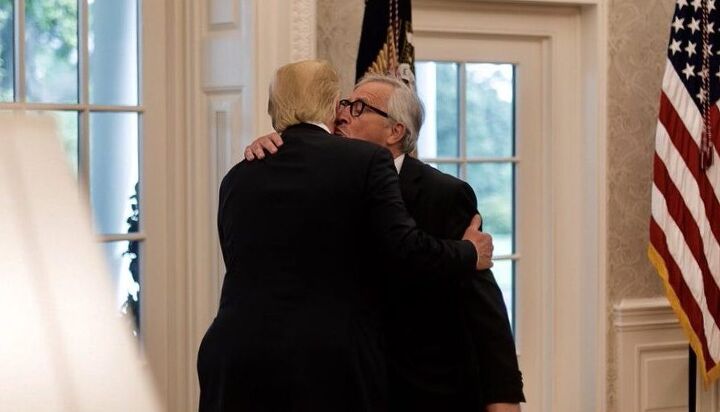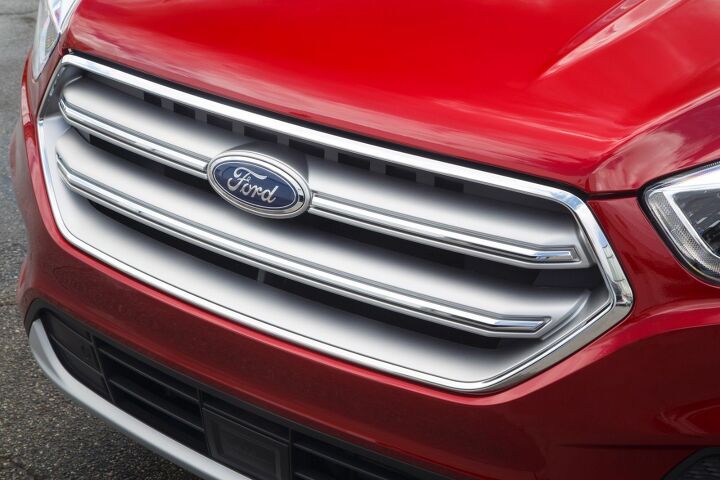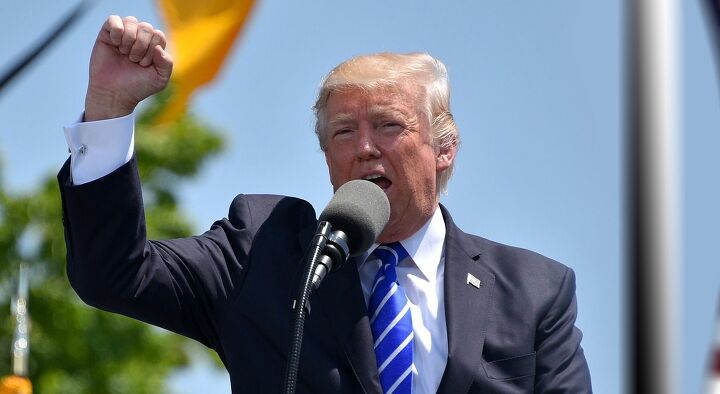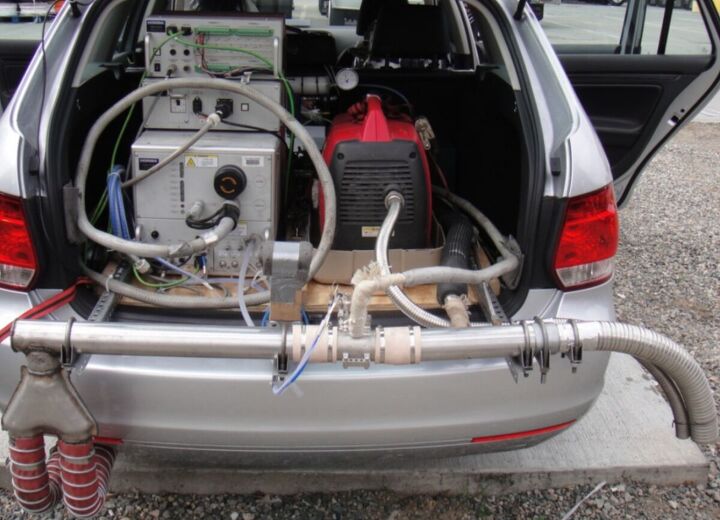#EuropeanUnion
Trump to EU: Expect Auto Tariffs Without Trade Deal
Earlier this week, the European Union warned that if the United States imposes any new tariffs on European-built vehicles, it can expect similar levies on American products. However, armed with the Commerce Department’s confidential report on automotive imports, President Donald Trump doesn’t appear remotely interested in backing down.
While Trump previously agreed not to impose additional duties on European cars, the arrangement hinged upon the two coming together on trade. Unfortunately, while both sides seem eager to work out a deal, they can’t quite manage to keep the constant threats down to a dull roar.
Ford Threatens to Pull Out of the United Kingdom
Ford Motor Company has reportedly informed British Prime Minister Theresa May of its tentative plan to move out of the United Kingdom. The automaker explained the situation to May during a private call with business leaders tasked with assessing how Brexit might impact the economy. Ford said it was already preparing to move its facilities — which include two engine plants, a transmission factory, and an R&D center — abroad.
With the European Union and British government still unable to establish trade terms, automakers are having a panic attack. Ford later told Reuters that a no-deal Brexit would be catastrophic for its European-based businesses, citing earlier claims that it would cost the manufacturer up to $1 billion.
Automakers Understandably Freaking Out Over 'No Deal' Brexit
With Britain’s parliament rejecting Prime Minister Theresa May’s latest Brexit deal, European automakers stand to face some strong headwinds in the near future. As of now, no clear path lies ahead. Many believe the European Union will continue playing hardball, punishing Britain for leaving. But, even if it doesn’t, loads of regulatory and trade issues must be resolved in short order to avoid problems.
There’s also no shortage of hyperbole surrounding the issue. Just this morning I heard cable news call it “the largest crisis in Britain’s history,” as if World War II never happened. A channel away, another outlet proclaimed how splendid it would be for trade between the United Kingdom and United States.
Regardless of which side of the fence you fall, there’s more at stake here than Theresa May’s job. Automakers, who like consistency above all else, worry a no deal plan for “British independence” could be tantamount to flipping the industry table. They don’t like being caught up in the uncertainty surrounding Brexit, and there appears to be an endless list of issues to contend with.
Europe Will Punch Back Against Any U.S. Car Tariff: EU Trade Commissioner
It’s been a trade-heavy week. Earlier, the White House decided to postpone any major tariff decisions following a discussion with the Commerce Department over a draft report on the impact of auto imports, giving trade representatives from the United States and European Union room to talk.
Unfortunately, things don’t appear to have gone swimmingly. European Trade Commissioner Cecilia Malmström left her Wednesday meeting with U.S. Trade Representative Robert Lighthizer promising that the EU would have retaliatory tariffs at the ready if America pulls the trigger on auto import duties. However, she also said some progress was made during her talk with Lighthizer, but had nothing conclusive to announce
Negotiating with the EU has grown difficult and, frankly, the automotive aspects have become less important of late. The European Union is now discussing the possibility of creating its own army, leaving president Trump to tweet angrily about historical precedents.
Trade War Watch: Were the Auto Tariffs Ever Supposed to Be More Than a Threat?
The U.S. Commerce Department has submitted draft recommendations to the White House on its investigation into whether it’s prudent to impose tariffs of up to 25 percent on imported automobiles and parts, based on the premise that they’re a threat to national security. The possibility has the industry in a tizzy, with both foreign and domestic brands lobbying against it.
Truth be told, we half assumed the entire concept was a ruse to bring other nations to the bargaining table with something to lose — a scenario where the United States could be viewed as a favorable alternative to tariff-crazy China. However, China has begun opening its market to foreign automakers while also placing a massive 40 percent duty on American autos, leaving the U.S. at a disadvantage. Now it looks as if the Trump administration may go through with everything.
European Union May Not Be Unified On Emission Regulations After All
With California and the Trump administration squabbling over vehicle emissions, it’s easy to assume that Europe’s green initiatives are progressing trouble free. In truth, things are a little more complicated. Europe has come together to endorse tougher emissions rules but one of its member states appears to be reaching its breaking point. Unsurprisingly, it’s the one that builds the most automobiles.
Earlier in the week, EU environment ministers announced a need for countries to decide on reduction targets for the foreseeable future. Germany has endorsed a proposed target for a 30-percent reduction by 2030, compared to 2021 levels. However, France and several other nations are pushing for a stricter 40-percent limit while Austria wants to see 35-percent reductions. Although, the most interesting thing about this is how closely Deutschland’s arguments for softer standards are to America’s.
Britain's Auto Industry Foresees Doom Without EU Deal Before Hard Brexit
Mike Hawes, chief executive of the Society of Motor Manufacturers and Traders (SMMT), Britain’s main industry group, claims automakers were becoming increasingly concerned with the nation’s departure from the European Union. Prime Minister Theresa May wants a solution that would allow Britain to maintain strong trade ties with the EU while allowing her country to maintain autonomy, but hasn’t found much success.
U.S. President Donald Trump claims a deal with the United Kingdom is absolutely possible, saying the relationship between the two countries is “the highest level of special” late last month. But he also noted that the EU would complicated matters if Britain adhered to its trade laws after Brexit, which is just eight months away.
The European Union doesn’t seem to want to let Britain go, and is nudging the country to stick to its rules by not venturing out to make its own trade arrangements. Critics say this effectively makes the island nation a “vassal state” to the EU, completely defeating the point of Brexit. However, many are fearful that leaving the union and ignoring its mandates could have negative repercussions in the long term — especially in regard to finance and trade.
Trump Puts Hold on New Auto Tariffs; Trade Negotiations Commence With Europe
President Donald Trump agreed on Wednesday to refrain from imposing car tariffs while the United States launches negotiations to cut other trade barriers with the European Union. After a meeting at the White House, Trump and European Commission President Jean-Claude Juncker agreed to begin talks that would also seek to resolve U.S. tariffs on steel and aluminum, as well as retaliatory duties from Europe.
It’s the first lull we’ve seen in the trade war in a while. Meanwhile, Chinese trade relations remain as bitter as ever.
Germany to Cities: Go Nuts With the Diesel Bans, Starting Now
It’s open season on compression ignition vehicles in the Fatherland. The birthplace of the diesel engine now says German cities can implement diesel driving bans whenever, and wherever, they want.
The Friday ruling by the country’s top court comes after a lawsuit against Germany and four other European Union member states by the EU, the result of higher-than-allowed air pollution levels in numerous urban areas.
“Thanks, dad,” the country’s auto industry must be thinking.
The British Car Market Is Flushing Itself Down the Loo; Industry to Follow?
After four years of consecutive growth, the United Kingdom’s automotive market has tanked for 12 months straight. The culprit is, of course, dwindling diesel sales.
Thanks to European governments latching onto the fuel as the cleaner alternative to “petrol” throughout the 1990s (subsequently incentivizing the fuel as a way to meet aggressive CO2-reduction targets), diesel-powered autos accounted for roughly half of all new auto sales between 2009 and 2017 . But diesel is now “evil” and everyone in Europe has started avoiding it.
In March, diesel sales declined by 37.2 percent — leaving the once dominant fuel with just 32 percent of the new car market. Unsurprising, as the new trend in Europe is the widespread (future) banning of the fuel in city centers. April’s sales are expected to be even lower, as the British government’s new taxes on diesel vehicles come into effect. Those fees and a weakened pound, which practically everyone has attributed to Brexit, forced new car sales in the UK down by 16 percent.
Ford Continues Fighting for Europe
Ford Motor Company has a lot invested in Europe. While the continent spent decades operating facilities under the lose leadership of Ford of Britain, Detroit acquired direct ownership in 1950. From there it extended its influence dramatically, buying up established European manufacturers near the close of the 20th century. But things haven’t always been good; economic hardships have been par for the course and things haven’t been easy in a long time.
Presently, Ford makes around $75,000 in profit for each of its employees in the United States. In Europe, that number is about $4,300 per worker. While we’re sure that makes domestic line workers feel entitled to a small pay increase, the point is that the profit margins across the pond are pretty slim for Ford.
However, unlike General Motors, the company doesn’t want to abandon the region. The automaker says it’s taking a renewed interesting in figuring how to keep profits up and is avoiding any speculation that it might duck out of Europe entirely. But let’s revisit its hardships over the last decade so we can establish a framework for why Ford is having a rough go of it.
Trump is Talking Tariffs Again, Takes Aim at European Cars
President Donald Trump amplified his earlier threat of a global trade war this weekend by suggesting he would impose a tax on European cars if the EU countered his proposed steel and aluminum tariffs. On Thursday, Trump called for a 25 precent import tariff for steel and a 10 percent fee on aluminum in the hopes it would bolster those industries domestically. Europe responded by threatening a tax on imported bourbon, blue jeans, and American motorcycles. Apple pie and baseball were not mentioned, but you get the idea.
European Union officials clearly wanted to send a message to the president to back down. Instead, he came back even harder in a tweet from Saturday. “If the E.U. wants to further increase their already massive tariffs and barriers on U.S. companies doing business there, we will simply apply a Tax on their Cars which freely pour into the U.S.,” he wrote. “They make it impossible for our cars (and more) to sell there. Big trade imbalance!”
Germany and Italy Oppose Stiffer European Car Approval Rules
Italy and Germany are opposing attempts to give the European Union more authority over the way national car regulators approve new cars for sale. As wild as it is to learn that Germany is standing in the way of stricter automotive regulation and oversight, allow us to assure you that you’ve not misread the above statement. For some reason, Deutschland doesn’t want to see enhanced industry surveillance.
Our best guess is that the opposition has something to do with Volkswagen Group’s diesel crisis, recent concerns that BMW may have utilized a “shut off” device that masked NOx emissions, and the ongoing investigation into a German automotive cartel that may have operated for decades. But there’s also a chance these automakers simply don’t want to deal with the red tape that comes along with piling on government oversight.
Car, Tell: Quintet of Safety Suppliers Fined for Price Fixing
It appears the fictional JR Ewing isn’t the only one having to deal with cartels. Antitrust regulators in the EU have fined five safety equipment suppliers a combined 34 million euros ($40 million) for taking part in a scheme to fix prices for seat belts and airbags sold to Japanese automakers.
The cartels were allegedly supplying the safety equipment to Toyota, Suzuki, and Honda at inflated prices between calendar years 2004 and 2010.
European Raids Expand to Daimler and VW in Automotive Cartel Probe
Following an earlier raid at BMW, Daimler AG and Volkswagen Group were also searched by antitrust officials from the European Union Commission and German government this week. Despite claiming whistleblower status, Daimler is still subject to investigation — though it’s less likely to incur the same financial penalties if the collusion charges go to court.
Over the summer, investigators from the EU stated there would be an investigation into several German carmakers after allegations surfaced that companies conspired to fix prices on various automotive technologies over several decades. But it wasn’t until Monday that officials searched Daimler’s corporate offices and collected documents from Volkswagen’s headquarters in Wolfsburg and at Audi’s home base in Ingolstadt.






























Recent Comments